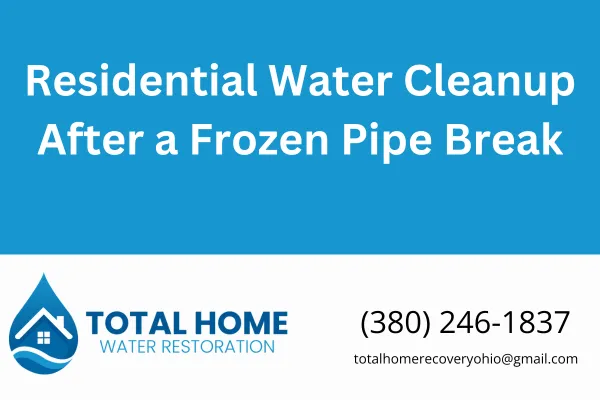
Residential Water Cleanup After a Frozen Pipe Break
Residential Water Cleanup After a Frozen Pipe Break
When a pipe bursts from freezing, it doesn’t just spill water—it wrecks drywall, ceilings, flooring, and sometimes even electrical systems. In Ohio, especially places like Grove City, Columbus, and surrounding areas, frozen pipe breaks are common during deep winter cold snaps. Here’s how we handle residential water cleanup when a frozen pipe ruins your day—and what you should do right after it happens.
What Happens When a Pipe Freezes and Bursts?
Water expands when it freezes. If that happens inside your plumbing, pressure builds up until the pipe cracks or bursts, often in basements, crawlspaces, or behind walls. Once the ice melts, gallons of water can pour into your home in minutes, soaking into wood framing, drywall, insulation, and carpet.
What You Should Do Immediately
If you find water gushing from a broken pipe, act fast:
Shut off the main water valve right away. (Know where this is before winter hits.)
Turn off electricity in affected areas if it’s safe to do so.
Call a licensed water restoration contractor (like us) right away. Delays increase the risk of mold.
Start removing excess water using towels or a shop vac—only if the water is clean and it's safe.
How We Handle Residential Water Cleanup
At Total Home Water Restoration, we follow IICRC S500 industry standardsfor professional water damage restoration. Here's the general process:
1. Emergency Water Extraction
We bring in high-capacity pumps and vacuums to remove standing water. The faster we do this, the less damage your structure takes.
2. Moisture Detection
Just because it looks dry doesn't mean it is. We use thermal cameras and moisture meters to find hidden water behind walls and under floors.
3. Drying and Dehumidification
We set up commercial air movers and dehumidifiers to dry everything out completely. Wood, drywall, insulation, and subfloors all need to hit proper moisture levels.
4. Demolition of Unsalvageable Materials
Soggy drywall, baseboards, and insulation often need to be removed. We’ll only tear out what’s necessary, and we always explain why.
5. Disinfection and Mold Prevention
Even clean water can breed mold if left for 24–48 hours. We apply antimicrobial treatments on affected areas to keep mold away.
6. Repairs and Restoration
Once it’s dry and safe, we handle the full repairs—drywall, painting, flooring, trim, and more. We restore it like it’s our own home.
Local Insight: Why Grove City and Central Ohio Homes Are at Risk
Many homes in Grove City and nearby towns were built with pipes in exterior walls or crawlspaces—both vulnerable to freezing. Plus, Ohio’s rapid freeze-thaw cycles push pipes beyond their limits. We see the most pipe breaks during January and February when temps dip below 20°F.
Common Questions We Get
How long does water cleanup take?
Anywhere from 2 days to over a week, depending on the extent of damage and how fast we get started.
Will insurance cover the cleanup?
Most homeowners’ policies cover sudden pipe bursts, but not long-term leaks. We’ll help document everything for your claim.
What about mold?
If water sits more than 48 hours, mold becomes a serious concern. We follow the IICRC S520 mold remediation standards when needed.
Need Help Now?
If your home has water damage from a frozen pipe, don’t wait. Call Tyler Zimmerman at Total Home Water Restoration today. We're based in Grove City and serve the entire Columbus metro area.
📍 4141 Hoover Rd, Grove City, OH 43123
📞 380-246-1837
